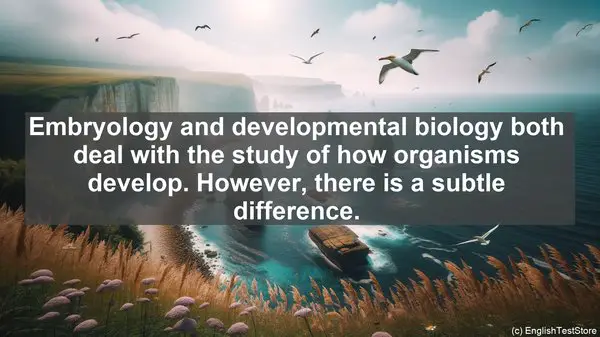Introduction
Today, we’re diving into the fascinating world of developmental genetics. As you delve deeper into this field, you’ll encounter numerous terms that may seem similar but have distinct meanings. In this lesson, we’ll unravel the top 10 commonly confused words in developmental genetics, ensuring you have a crystal-clear understanding of each term. So, let’s get started!

1. Gene vs. Allele
One of the fundamental concepts in genetics is the gene. It’s the basic unit of heredity, carrying the instructions for a particular trait. Now, an allele is a variant form of a gene. For example, the gene for eye color may have different alleles, such as blue, green, or brown. So, while a gene is the general term, an allele refers to specific variations of that gene.
2. Genotype vs. Phenotype
When studying an organism, we often come across the terms genotype and phenotype. The genotype refers to the genetic makeup of an individual, the combination of genes they possess. On the other hand, the phenotype is the observable characteristic, the trait that is expressed. For instance, while an organism may have the genotype for tallness, the phenotype would be their actual height.
3. Homozygous vs. Heterozygous
Genes can exist in different forms within an organism. If an individual has two identical alleles for a particular gene, they are said to be homozygous. Conversely, if they have two different alleles, they are heterozygous. Homozygous individuals often display the trait associated with that gene more prominently, while heterozygous individuals may exhibit a blend of traits.
4. Dominant vs. Recessive
When it comes to gene expression, some alleles are dominant, meaning their effect is more pronounced. Others are recessive, and their effect is only observed when both alleles in a pair are recessive. For example, in the case of eye color, the allele for brown is dominant, while blue is recessive. So, if an individual has even one brown allele, their eyes will be brown.
5. Mutation vs. Polymorphism
In the context of genetics, a mutation refers to a change in the DNA sequence. It can be a small alteration or a significant rearrangement. On the other hand, a polymorphism is a variation that is present in a population. While mutations are often associated with diseases or disorders, polymorphisms are more common and may not have any adverse effects.

6. Genomics vs. Genetics
Genetics is the study of individual genes and their functions. It focuses on the molecular aspects of inheritance. Genomics, on the other hand, is a broader field that encompasses the study of an organism’s entire genome, including interactions between genes, gene expression, and more. So, while genetics is like zooming in, genomics is zooming out.
7. Embryology vs. Developmental Biology
Embryology and developmental biology both deal with the study of how organisms develop. However, there is a subtle difference. Embryology specifically focuses on the early stages of development, from fertilization to the formation of organs and tissues. Developmental biology, on the other hand, encompasses the entire process, including growth and maturation beyond the embryonic stage.
8. Epigenetics vs. Genetics
While genetics is concerned with the DNA sequence itself, epigenetics is interested in the modifications to the DNA that can influence gene expression. These modifications, such as DNA methylation or histone acetylation, can turn genes on or off, affecting their activity. So, epigenetics is like the ‘switches’ that control gene expression, while genetics is the ‘code’ itself.
9. Transcription vs. Translation
In the central dogma of molecular biology, transcription and translation are two essential processes. Transcription is the synthesis of RNA from a DNA template, while translation is the conversion of that RNA into a protein. Think of it as transcribing a recipe (DNA to RNA) and then using that recipe to cook a dish (RNA to protein).
10. Mutagen vs. Carcinogen
Both mutagens and carcinogens have the potential to cause harm, but in different ways. A mutagen is an agent that can induce mutations in DNA. These mutations can have various effects, including diseases or disorders. On the other hand, a carcinogen is a substance that can cause cancer. While all carcinogens are mutagens, not all mutagens are carcinogens.
